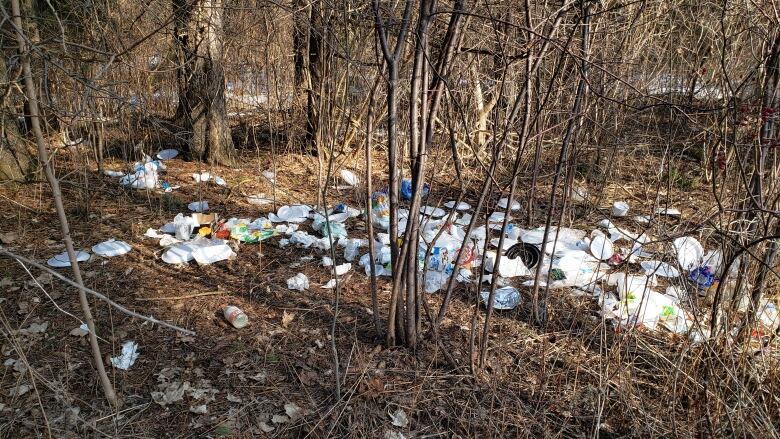Ontario parks have seen a spike in garbage. A new campaign is trying to change that
#ForTheLoveOfParks hopes to encourage visitors to follow the rules, keep sites clean

After a dramatic rise in the number of people using Ontario's parks during the pandemic, the province and the federal government are teaming up to launch #ForTheLoveOfParks a campaigntoencouragevisitors to abide by therules and to keep sites clean.
"The goal is to try and raise awareness on visitor safety, to promote positive visitor behaviour, to promote people taking care of the protected sites we have here in Ontario," said Sarah Quinlan Cutler, the external relations manager atParks Canada.
Ontario's national and provincial parks saw nearly 13 million visitors in 2020, according to Parks Canada,which is joining forces with Ontario Parks to run the campaign.
"We also saw an increase in some unsafe and negative visitor behaviour," Quinlan Cutler said.
She said both provincial and national parks have seen a drastic spike in litter, illegal dumping, off-trail hiking, people feeding wildlife, vandalism, among other behaviours that threaten protected spaces and pose challenges for park staff.

"We saw people showing up for back country camping without proper equipment and without being prepared. And some of that resulted in having to do rescues," she said.
"And unfortunately, we did see some aggression towardour staff as well."
The campaign which will includevideos ofparks staff speakingdirectly to visitors and a social media push aimsto educate people before they arrive atparksto ensure a better outdoor experience.
Outfitters see an increase in first-time campers
It's welcome news for long-time outdoor enthusiasts like Gayle Labuz.
She says she's seen a surge in people who are trying out camping for the first time.
"I think it's fantastic," Labuz said. "But the bitter part of it is, unfortunately, there's a lot of people who are unprepared when they do get outside."
Labuz says those who venture outdoors should do their research before heading out to the parks.
"I think what we're seeing is a lot of people who don't mean to be breaking the rules, they just don't really know the rules as well as they should have known before they booked their sites," she said.
Education is key
Randy Mitson,the marketing director for Algonquin Outfitters in Huntsville, Ont.,says most visitors wholeave garbage or feed wildlifearen't acting maliciously, but are just not aware of the impact of their actions.
"Education is the best way to let people know what they should and shouldn't be doing," he said. "And also let them know how to have a good time."
Mitson says his advice is to abide by one common rule when it comes to outdoor activities: leave no trace meaning whatever you take into the park, make sure to take it out.
"We want to make sure we keep things really clean and tidy. Take your garbage home with you. Don't leave it behind. And that way, we're not going to be causing wildlife to do things that they're not supposed to be doing," he said.
The campaign will continuethroughout the 2021 season tohelp visitors have a better outdoor experience to encouragethem to return for generations to come.
"Having your knowledge in advance just removes those concerns and worries about what you're doing when you're on site," Labuz said.
"And then you can concentrate on the bigger reason why you're out there: To enjoy nature."












_(720p).jpg)


 OFFICIAL HD MUSIC VIDEO.jpg)
.jpg)



























































































